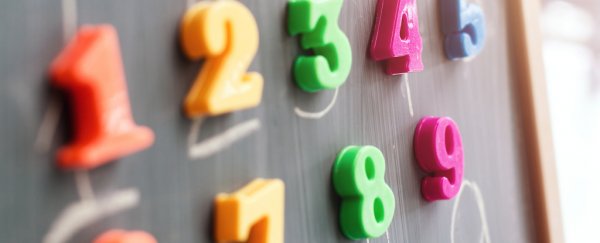If a recent poll conducted by the US market research company CivicScience is to be taken at face value, roughly one out of every two Americans doesn't think Arabic numerals should be taught as part of the curriculum in US schools.
Yes, these numerals are the same crucial ten digits (0 to 9) we use every day.
This is at once shocking and unsurprising in a world where political tensions are high and general science literacy is questionable. The science of tribalism could help us understand the numbers, but it might also get us closer to a solution.
Last week, CivicScience CEO John Dick posted evidence of what he felt was a "testament to American bigotry" in the form of responses to a recent poll.
Ladies and Gentlemen: The saddest and funniest testament to American bigotry we've ever seen in our data. pic.twitter.com/Bh3FBsl8sR
— John Dick (@jdcivicscience) May 11, 2019
Unfortunately there isn't a lot more to analyse as far as the polling data goes, other than a screenshot of the response and a tweet showing the breakdown of political affiliations of the 3,624 respondents.
But going on this single question in a single poll, some 56 percent of Americans either crave a return to Roman Numerals, or are unaware that the Hindu-Arabic system of numerals has been a solid part of US curricula for generations.
If you're curious as to why the system is named this way, here's a super-quick history lesson.
Around 400 CE, in what is today India, a system of symbols was being developed to represent numbers in a way that made arithmetic pretty quick and easy to do. It was such a hit, travellers from the west picked it up while crossing back and forth through Persia, adding their own tweaks and flourishes. This is why it's technically the Hindu-Arabic system of writing numbers.
Some early adopters in Europe, like the 13th century Italian mathematician Leonardo Bonacci (you might know him as simply Fibonacci), saw its benefits over the clumsy Roman figures, and ran with it. The rest of the western world held off a couple of centuries, when the printing press spread the fancy new numerals near and far.
This is the short version, but clearly the figures 0 to 9 many of us learn on Sesame Street have a multicultural history that's often taken for granted as being largely western.
Throw in an unhealthy degree of antipathy towards Middle Eastern minority cultures and that 56 percent figure is almost expected.
A reply from Dick to a question on the political breakdown of other polling responses offers his own perspective on the polling.
Our goal in this experiment was to tease out prejudice among those who didn't understand the question. Most people don't know the origins of our numerical system and yet picked a tribal answer anyway. You can argue that one is worse than the other but both prove a similar point.
— John Dick (@jdcivicscience) May 15, 2019
It's hard to argue with his view that tribalism is a strong motivating force when it comes to science education.
As a full disclaimer, I wrote a book a number of years ago titled Tribal Science, arguing this very thing. Our tendency to identify facts based on who we identify with as our people is intrinsic to our way of thinking.
Unfortunately, unless your brain is especially unique, that means you as well.
Where many people think our number system isn't (or shouldn't be) Arabic because of their tribal values, others will be quick to make assumptions on how such misinformation arises in the first place, also based on their own tribal affiliations.
While there are established examples of hateful political leaders foolishly calling for Arabic numbers to be banned, some of us are also quick to share satirical news reports that make leaders seem particularly ignorant.
Admittedly, in a world where fake news often clashes with Poe's law, taking the time to tell the difference between fact and reality can take some extra critical brain power.
Fortunately science gives us a pretty good grasp of the kinds of tribal biases that affect how we learn not just about number systems, but everything from climate change to evolution, from the shape of our planet to whether to vaccinate our kids.
Tribalism is a wedge that isolates us from handy scientific knowledge.
But that also gives us a pretty good place to start if we want to turn that 56 percent into a number that's a little less shocking. It starts with finding what we have in common, rather than what drives us apart.
